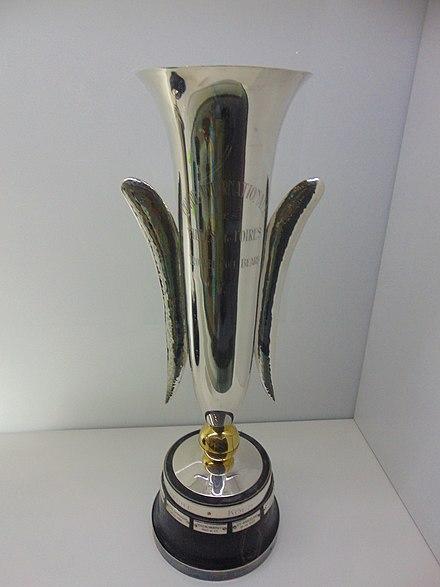From Inter-Cities to Europa League
The story of The Inter-Cities Fairs Cup
BY Vince Cooper
Part One. 1955 to 1962
The Inter-Cities Fairs Cup ran from 1955 until 1971 when it became the UEFA Cup. Surprisingly, the original idea came from FIFA rather than UEFA and it was that the tournament would be between cities rather than clubs. The idea was to promote trade fairs in those cities (hence the name). In fact the full name was International Industries Fairs Inter-Cities Cup. And you thought Inter-Cities Fairs Cup was a mouthful!
1955-58
But from the very start it was a mix of cities and clubs. For instance, London entered the first competition with players from no fewer than eight different teams whilst the first winners were a Barcelona XI featuring players from both Barcelona and Espanyol.
London’s group contained teams from Frankfurt and Basle and they opened their campaign with an early June trip to Switzerland where they hammered a Basle XI 5-0 thanks to a hat-trick from Arsenal’s Cliff Holton and two from Eddie Firmani of Charlton.
London’s next match was a home tie against Frankfurt and it got its own place in history as the first match played under floodlights at Wembley.

Wembley’s first match under floodlights
A crowd of 42,000, no doubt kept down by driving rain and the fact that the match was live on television, saw Alfred Pfaff of Eintracht score the first goal under Wembley’s lights from the penalty spot after Charlie Hurley of Millwall had felled Richard Kress, then Kickers Offenbach’s Gerhard Kaufhold doubled the German lead after half an hour and they also hit the the post twice in a first-half they dominated.
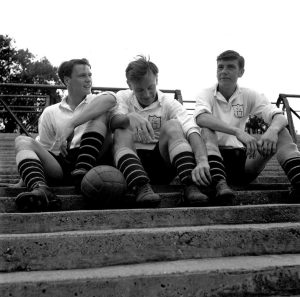
Bobby Robson, Bedford Jezzard and Johnny Haynes of Fulham
But London came storming back and the Fulham pair of Bedford Jezzard (2) and Bobby Robson got the goals as the home team turned it around, turning a 2-0 deficit into a 3-2 win.

George Robb. Grabbed the winner
A late George Robb goal on his home ground gave London their third successive win when they overcame the Basel XI at White Hart Lane and although they lost their last match in Germany six points were enough to see the Londoners through to the last four.

Joe Haverty
The semi-final matched London with Lausanne and the first-leg in Switzerland saw them fall to a 2-1 defeat with Arsenal’s winger Joe Haverty scoring the goal.
Highbury hosted the return leg and Fulham’s Johnny Haynes ran the show.

London v Lausanne
Haynes, skipper for the night, set up 17-year-old Chelsea starlet Jimmy Greaves for the hosts’ opener and then laid the second on for Cliff Holton of Arsenal to send London through to the final.
One club that entered the first tournament (which started in 1955 and wasn’t concluded until 1958 with the final played over 1,000 days after the first match) was Birmingham City and they too made progress, winning their group before bowing out at the semi-final stage.
City’s three-team group had Inter and a Zagreb XI as their opponents and City got off to a good start with a goalless draw in Milan. The match was played at the 10,000 capacity Civic Arena rather than the San Siro with teams fielding weakened line-ups due to international calls and, in City’s case, injuries suffered in the FA Cup final defeat to Manchester City 11 days before.
Less than a week later Arthur Turner’s team travelled to Yugoslavia and recorded a 1-0 win over a Zagreb XI courtesy of an 8th-minute goal by Eddy Brown in front of 18,000 fans.
City had to wait seven months for their next match when Zagreb visited St Andrews and the hosts, despite missing four first-team regulars through injury, ran out 3-0 winners in front of a healthy crowd of 43,500. It was the second-ever match played under floodlights at the ground.

Eddy Brown
Bryan Orritt, Eddy Brown and Peter Murphy notched the goals in a match that was novel in that it featured three substitutes, one for City and two for their guests, an unheard of occurrence in England at the time.
Like City, Inter had recorded a double win over Zagreb so progress would be decided in the final match, which took place at St Andrews on 17 April 1957, 11 months after the first clash between the pair.
There was a crowd of 34,461 at St Andrews and they cheered City home as left-winger Alex Govan scored twice to send the home team through to the last four.
Lorenzi pulled a goal back for the Italians in the last minute but it proved just a consolation as City went on to a semi-final clash with Barcelona.
The match, and indeed the competition, weren’t welcomed with open arms by all. Indeed, writing in the Birmingham Post after the win, Cyril Chapman’s opinion was that; “One was left wondering if the reward of progress in this competition was really worth some of the excessive vigour employed in trying to attain it”.
The ‘excessive vigour’ didn’t seem to have a negative effect on City who, three days after the win, recorded their best result of the season, hammering Leeds United 6-2.
City then had to wait another six months before their next match in the competition with a Barcelona XI visiting St Andrews in October.
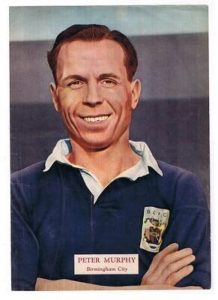
Peter Murphy. Double strike
With Ken Green, Johnny Newman and Jeff Hall all absent from their defence, the Blues were shaky at the back and after taking the lead through Eddy Brown with just three minutes on the clock, fell behind when Tejada and Evaristo scored for the visitors. Bryan Orritt levelled for City after half an hour. Villaverde restored the lead for Barcelona with a stinging volley but there was still time before the break for Peter Murphy to restore parity for the hosts.
The 30,791 crowd had less to be excited about in the second period but home fans left happy when a Murphy effort gave Barcelona keeper Ramallets no chance after 62 minutes to send Birmingham to Spain for the second leg with a 4-3 advantage.
The second leg took place three weeks later and many in the 60,000 crowd booed what they felt were defensive tactics by the English team. It was a much tighter match than the first encounter with City holding out until just four minutes from time when star striker Laszlo Kubala netted to level the tie on aggregate.
This was before UEFA brought in the ‘away goals count double’ rule so with the teams level at 4-4 overall a play-off was necessary.

Lazslo Kubala
The third match took place 13 days later at the St Jakob stadium in Basel and after Peter Murphy had cancelled out Evaristo’s early strike it was Kubala who again proved the hero for the Spaniards, grabbing the winner with seven minutes left to send his team through to the final clash with London.

The programme for the first-leg of the final with the competition’s full title
The first leg of the final was played at Stamford Bridge on 5 March 1958 in front of 45,466 fans and within five minutes both teams had scored. Justo Tejada fired the Spaniards in front but London went straight to the other end and equalised through Jimmy Greaves after good work by Vic Groves.

Jim Langley. Late penalty
Barcelona went in front for a second time just before the break when Eulogio Martinez fired home and they held on to their advantage until two minutes from time when Bobby Smith was bundled over in the box and Fulham’s Jim Langley rammed home the penalty.
The second leg took place two months later and London fielded just four of the players that had played in the first match.
A crowd of 70,000 saw the Spanish team strike twice in the first six minutes with both coming from Luis Suarez and from then on it was plain sailing for the hosts.
Eulogio Martinez added a third before the break and there were three more goals in the second period from Evaristo (2) and Martin Verges to complete a resounding win, 6-0 on the day, 8-2 on aggregate.
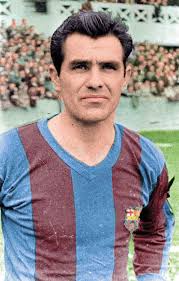
Evaristo
London’s cause wasn’t helped when Jack Kelsey was injured and his Arsenal teammate Vic Groves had to go in goal but they were already four down at the time and the injury occurred when an Evaristo shot pierced the keeper’s hands, hit him in the face and rebounded into the goal.
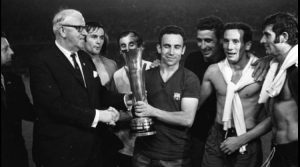
Barcelona receive the trophy
1958-60
Birmingham were again in the tournament for the 1958-60 staging – and they would go one before frustratingly being denied by the same opponents
There were six representative teams among the 16 taking part with the others being club sides.

Chelsea v Frem (+guests)
This time it was decided to go with a straight, two-legged knockout competition for the 16 teams and City were drawn to play a Koln XI in the first round whilst this time London, now represented by Chelsea rather than a mixed team were paired with KBU (Copenhagen) a team that was drawn mostly from BK (Frem) fortified by three guests.
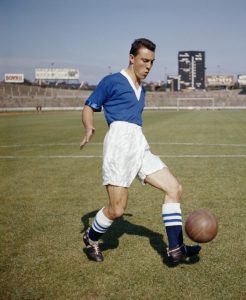
Chelsea’s Jimmy Greaves
The Londoners travelled to Denmark for the first leg and recorded an easy 3-1 win with Mike Harrison, Jimmy Greaves and Tony Nicholas on the scoresheet.
The return, in front of a disappointing crowd of just over 13,000 at Stamford Bridge saw Chelsea. given an ideal start when English-born George Lees put through his own net after just five minutes.

Jimmy: Prolific
The Danes equalised almost immediately through Wily Schoene and then spurned a great chance to take the lead when Jens Peter Hansen’s soft penalty was easily saved by Reg Matthews. The home team then took over with the prolific Greaves getting two more and full-back Peter Sillett also finding the net for a 4-1 win, 7-2 on aggregate.
Meanwhile Birmingham found themselves in a hole in their first leg against the Koln XI in Germany, falling 2-0 behind inside the first 12 minutes with Franz Brungs and Hans Pfeiffer scoring for the hosts.
But City fought back. A Dick Neal header halved the deficit before the break and with an hour gone, right-winger Harry Hooper headed the equaliser to send the British servicemen among the 12,000 crowd back to their barracks happy.
City had little real trouble in the second leg, dominating against their injury-hit opponents.
After a goalless first-half Bunny Larkin gave the home team the lead and Brian Taylor then scored to wrap up a 4-2 aggregate win.

Peter Brabrook. Got Chelsea’s goal
In the quarter-final Chelsea played a Belgrade XI and won an ill-tempered home leg thanks to a first-half Peter Brabrook strike. But the match was marred by a number of unsavoury incidents culminating in a visiting player being elbowed in the face.
The Yugoslavs got their revenge when the teams met two weeks later, scoring four times with Chelsea, missing Jimmy Greaves who was touring America with England, managing just a Tony Nicholas goal in response to send Belgrade through 4-2 on aggregate.
Birmingham were drawn to face a Zagreb XI and after winning their home leg thanks to a solitary Bunny Larkin goal, looked to be making their way through when Larkin scored twice and Harry Hooper also found the net to put them 3-1 up in the return.
The Yugoslavs hit back, scoring twice but Pat Beasley’s team held on to qualify despite the loss of centre-half Trevor Smith who was sent-off along with home forward Dionizije Dvornic three minutes from time.
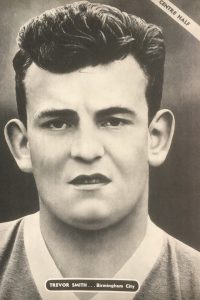
Trevor Smith: Sent off
City boss Beasley was shocked by the decision saying after; “I saw the Zagreb player kicking Smith on the ground but there was no retaliation by our man.
“It was very unfortunate and very unfair in my view”.
So City reached the last four for the second time where they were drawn to play Belgian side Union Saint-Gilloise with the other last-four clash pairing holders Barcelona with Chelsea’s conquerors Belgrade.
There was another interminable wait – this time five-months – before the semis were played with the previous matches taking place at the end of the 1958-59 season and the following campaign well underway before battle re-commenced.
City travelled to Brussels for their first leg and despite falling behind early, goals from Harry Hooper, Johnny Gordon, Brian Taylor and Jimmy Barrett saw them race to a convincing 4-2 win, a result they repeated in the second leg.
Meanwhile reigning champions Barcelona saw off Belgrade recording a 3-1 win in Spain after drawing the away leg, meaning that the second staging’s final would be a repeat of one of the inaugural semis.
Yet another long wait ensued before Barcelona travelled to Birmingham at the end of March 1960 for the first leg of the final.
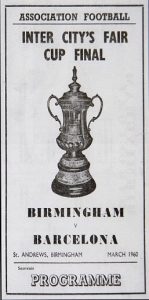
The publishers of this pirate programme couldn’t get the name right, or the trophy!
As the champions of Spain, Barcelona were also competing in the European Cup and had recently thrashed English champions Wolves 9-2 on aggregate to reach the last four (where they would be knocked out by compatriots and perennial winners Real Madrid) and were hot favourites to see off a City side engaged in a fight against relegation.
A crowd of over 40,000 were at St Andrews and they saw the home team produce a fine rearguard display to hold the team regarded by many as Europe’s finest to a goalless draw.
Quick-tackling defending and an excellent performance from goalkeeper Johnny Schofield held the potent Catalan forwards at bay and in fact City could have produced an unlikely win when Johnny Gordon was upended in the penalty area late on. But the Belgian referee ignored appeals and waved play on and the match finished all-square.

Barcelona coach Helenio Herrera
The Spanish club’s legendary coach Helenio Harrera was full of praise for his team’s opponents after the match, saying; “We played as good or even better football that we did against Wolves. Birmingham played very well. They had plenty of fighting spirit”.
But when asked about the return leg, Herrera had little doubt. “Surely we will win”, he said.
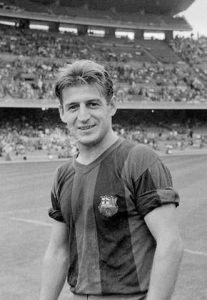
Zoltan Czibor
And Herrera was proved right as Barcelona, in front of 70,000 fans at the Camp Nou, quickly took a 2-goal lead in the first six minutes through Eulogio Martinez and Zoltan Czibor. The Hungarian Czibor added a third just after half-time and Luis Coll made it four before Harry Hooper grabbed a late consolation for the visitors.

The Second leg
So the Spaniards retained the cup – again completing a Spanish double with Real Madrid winning the European Cup – and they would be back to defend it a year later.
1960-61
There were 16 teams in the 1960-61 staging with the competition now being run over the course of a traditional season rather than spread out over two or more.
British representation saw Birmingham City again appearing on behalf of England whilst Hibernian became the first Scottish team to appear in the competition.
Hibs received a walkover in the 1st Round when intended opponents Lausanne Sports withdrew whilst Birmingham overcame Hungarian opposition in the shape of Ujpest Dozsa with a 5-3 aggregate win.
Holders Barcelona made their expected progress, seeing off a Zagreb XI although a 5-4 aggregate win shows it wasn’t straightforward whilst there were also wins for Italian pair Inter, who thrashed Hannover 14-3 over the two legs, and Roma who saw off Union Saint-Gilloise with a 4-1 home win after a goalless first leg.
Both Italians made it through to the last four with Inter and Roma beating XIs from Belgrade and Cologne respectively whilst Birmingham City continued their superb form in the competition when seeing off KB Copenhagen.

Jimmy Bloomfield. Euro debut goal.
After a 4-4 draw in Denmark, City introduced new signings Jimmy Bloomfield and Jimmy Harris in the return and both got on the scoresheet in a resounding 5-0 win, Robin Stubbs with two and Mike Hellawell also finding the net.
But the big surprise of the last eight encounters came when Hibernian faced Barcelona.
The Scots travelled to Spain for the first leg and raced into a two-goal lead through Joe Baker and Johnny MacLeod. Two headers from Sandor Kocsics levelled the scores but Baker again and Tommy Preston restored the advantage and saw Hibs 4-2 up with just over five minutes remaining. But Kocsics completed a hat-trick of headers and Evaristo scored in the last minute to send the teams back to Edinburgh all square.
A crowd of 45,000 packed into Easter Road for the return and they witnessed another thriller.

Joe Baker of Hibernian
It was Joe Baker again – still only 20 but rapidly forging the reputation that would see him earn a big-money move to Italy – who put Hibs in front but the Catalans not only levelled through Eulogio Martinez, but then took the lead for the first time in the tie when the first leg’s hat-trick hero Sandor Kocsics fired home.
Hibernian battled back, equalising through Tommy Preston and then, with just five minutes left, drama. A tussle in the Barcelona penalty area saw referee Johannes Malka point to the spot.
The German was then surrounded by players from the Spanish team who reportedly punched and kicked him and Police officers came onto the pitch in a bid to help restore order. Malka didn’t send anyone off only because; “There were too many players protesting – I might have got the wrong man”, he said after.
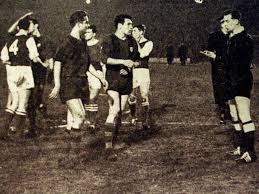
Penalty!
Wing-half Bobby Kinloch kept his cool after the rumpus and fired home the spot-kick to give his team victory and surprising but well-deserved progress at the expense of the only team to win the competition to date.
So it was Great Britain vs Italy in the semi-finals with Birmingham drawn to face Inter and Hibernian given a match-up with Roma.
City travelled to the San Siro and raced into a two-goal first half lead with Jimmy Harris set up by Jimmy Bloomfield for the first and then Costanzo Balleri heading into his own net when trying to clear a Mike Hellawell cross.
Eddie Firmani pulled a goal back for the Italians after the interval but City held out as the hosts pressed for an equaliser and took a one-goal lead back to St Andrews.
There they took an early lead through Jimmy Harris with newcomer Bertie Auld having a hand in the goal on his debut. Harris added a second 15 minutes into the second period and though Enea Masiero pulled one back City held in comfortably to win at home for the tenth time in eleven matches in the competition and reach their second successive final.

Joe Baker leaps over Roma ‘keeper Panetti
At Easter Road, Hibernian twice fell behind to Francisco Lojacono goals but hit back first through Joe Baker and then, with just eight minutes remaining, when a Johnny MacLeod shot found its way past Fabio Cudicini.
For a long time in the second leg at the Stadio Olimpico, Hibs looked to be on their way through.
Although Argentine striker Pedro Manfredini had put the hosts ahead, a goal from Bobby Kinloch along with a brace from Joe Baker gave the Scots a 3-1 advantage with just over 20 minutes remaining.
But Manfredini struck again and a 72nd-minute Francisco Lojacono strike left the tie all-square and a third encounter would be needed to separate the teams.
Roma won the coin toss meaning Hibernian had to travel to Italy again for the third encounter and their first-ever European campaign ended in inglorious fashion as they were hammered 6-0.

Pedro Manfredini
Manfredini was the star of the show scoring four times with Giampaolo Menichelli and Swedish star Arne Selmosson also finding the net.
Bobby Kinloch missed an early penalty for Hibs and Joe Baker, playing his last game for the club before joining Torino for £75,000 was largely ineffective though, to be fair to the Scots, their season had ended almost a full month earlier so fitness levels for some players might have been questionable.
The two-legged final took place over a month into the 1961-62 season and with that season’s competition having already started where the two teams both receiving first round byes.
City had made a bad start to the new season and this was reflected in a disappointing St Andrews attendance of just over 20,000 for the first leg of the final.
The home team’s poor form continued and a pair of goals from that man Manfredini seemed set to give Roma an away win, especially with Fabio Cudicini looking unbeatable in the visiting goal. But late strikes from Mike Hellawell and Bryan Orritt earned the hosts a draw that had seemed unlikely for much of the match.
In front of a passionate 60,000 crowd at the Stadio Olimpico City held out until ten minutes after the break when Francisco Lojacano pressured full-back Brian Farmer who turned the ball past his own ‘keeper.
With the visitors desperately seeking an equaliser, Roma broke away in the last minute and added a second through Paolo Pestrin to secure the win and the trophy,

Roma’s lap of honour
1961-62
The 61-62 staging of the Cup saw the number of teams competing increase to 26 with three each from England, Italy and Spain and two from Scotland, France and West Germany among the contestants.
English teams had mixed fortunes in the 1st Round. Birmingham received a bye and Sheffield Wednesday produced a fine turnaround against Lyon to join them in the second stage.
3-0 down early on in the first leg in France, Wednesday came back but still lost 4-2 to give themselves a difficult task in the second match at Hillsborough.
The task got even harder when Lyon took a 6th-minute lead but the Owls came roaring back and an 85th-minute strike from Johnny Fantham secured a 5-2 win on the night and progress to the next stage.
There was no such comeback for Nottingham Forest against Valencia. A brace from Brazilian star Waldo in the away leg saw Andy Beattie’s men return to the City Ground with a two-goal mountain to climb.
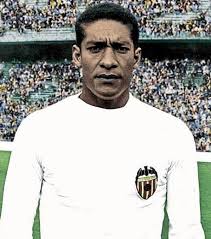
Waldo of Valencia
When the teams met again Waldo struck twice more inside the first 15 minutes and a hat-trick from Uruguayan Hector Nunez brought Valencia’s tally to five with Forest managing only a Billy Cobb goal in reply.
Forest’s cause wasn’t helped when Geoff Vowden was forced to miss the return – due to a crossword.
The forward was completing the puzzle and asked a teammate to pass him a pencil. It was thrown to him but he failed to catch it and it caught him in the eye with the injury requiring specialist treatment.
Scotland had Edinburgh pair Hibernian and Hearts representing them, and both progressed.
Hearts beat the Belgians of Union Saint-Gilloise 5-1 on aggregate whilst Hibs got the better of Portuguese team Belenenses, winning on the road 3-1 after a 3-3 draw at Easter Road.
Hungarian team MTK produced the biggest win of the round, beating French outfit Strasbourg 10-2 in the second leg to produce a 13-3 overall success whilst all three Spanish sides, Valencia, Espanyol and Barcelona, progressed.

Gerry Hitchens of Inter
Scottish interest ended in the 2nd Round with both Hearts and Hibernian suffering comprehensive defeats to Inter (for whom Gerry Hitchens was on the scoresheet twice) and Red Star Belgrade respectively whilst Birmingham City also came unstuck against Barcelona’s ‘second club’ Espanyol with a 1-0 win at home not enough too pull back a 5-2 deficit from the first leg.
Sheffield Wednesday appeared to have been given the toughest task of the British representatives with a tie against holders Roma but the Hillsborough leg proved a personal triumph for Gerry Young.

Gerry Young of Sheffield Wednesday
Later in his career Young would switch to wing-half, become a regular and win a cap for England but at the time of the Roma match he was a rarely-used centre-forward.
A hat-trick against the Italians was definitely the high point of Young’s time up front and with Johnny Fantham also finding the net the Owls took a four-goal advantage into the second leg.
Although a Peter Swan own-goal gave the holders victory in the return match, Wednesday held on comfortably to shock Roma and reach the last eight.
Alas the quarter-final was to prove the end of the road for Wednesday although they put up a brave fight before falling to Barcelona.
The first leg at Hillsborough saw Wednesday twice fight back from a goal down to record a 3–2 win with goals from Johnny Fantham (2) and Alan Finney.

Sandor Kocsics
It gave them a glimmer of hope for the visit to the Camp Nou but a crowd of 75,000 saw first-half goals from Evaristo and Sandor Kocsics proved enough to secure progress for the Spanish side.
Barcelona were joined in the last four by compatriots Valencia who got the better of Inter whilst Red Star Belgrade denied a third Spanish team, Espanyol, a place in the semi-final and MTK of Hungary beat a Novi Sad XI from Yugoslavia to complete the line-up.
The two Spanish teams were kept apart in the semis and made comfortable progress winning both the home and away legs, Valencia winning 10-3 on aggregate against MTK and Barcelona seeing off Red Star Belgrade 6-1 over the two matches.
Valencia basically put the cup out of Barcelona’s reach in the first leg of the final.

Vicente Guillot of Valencia
A crowd of 65,000 saw The Bats score six times with Vicente Guillot grabbing a hat-trick, Nando Yosu finding the net twice and Hector Nunez also scoring.
In fact Barcelona led twice through Sandor Kocsics but went into the home leg facing a four-goal deficit.
Kocsics scored again in the return but that was the only one Barcelona managed and a late leveller from Guilot saw Valencia run out 7-3 winners on aggregate and become Spain’s second winners of the trophy.
In The Next Part: 1963 onwards
The next season’s competition saw the number of contestants rise from 28 to 32 with new countries entering the fray including Eire, Northern Ireland and Turkey, but how would they fare? And would holders Valencia mount a successful defence.
Find out in Part Two!

